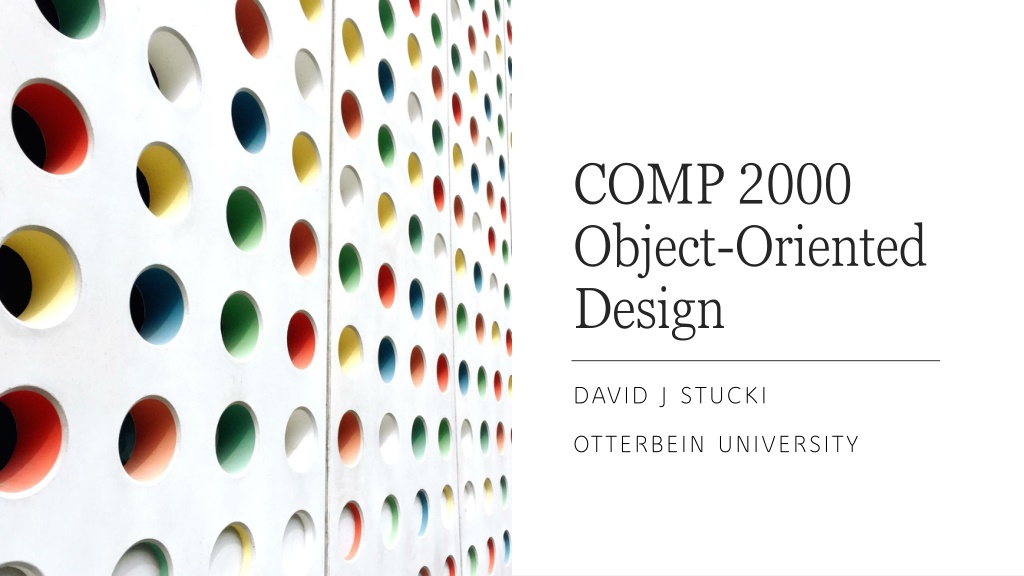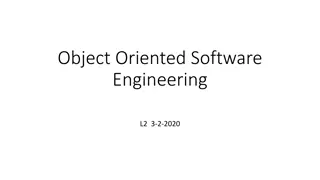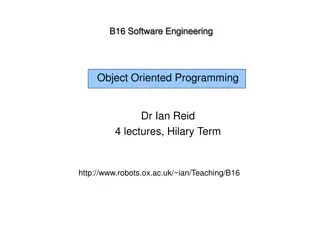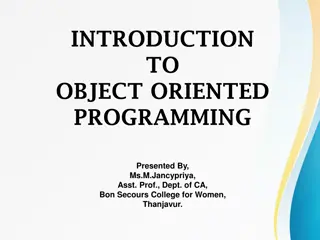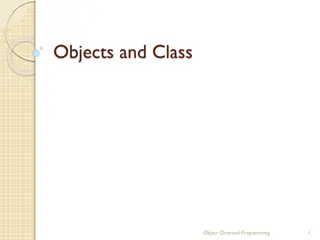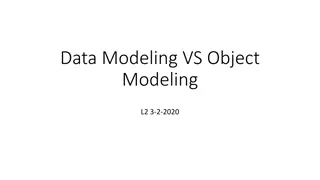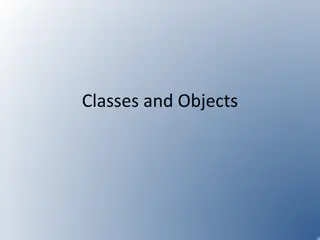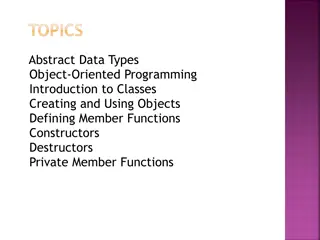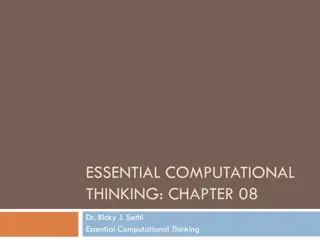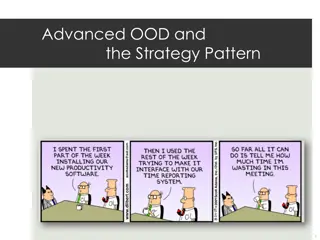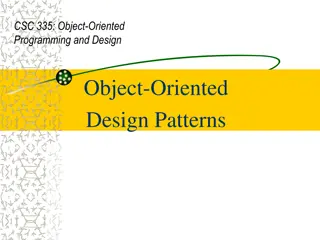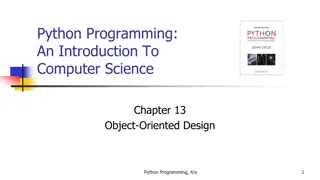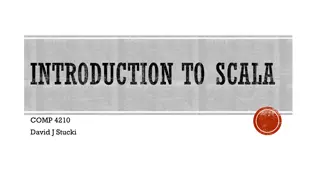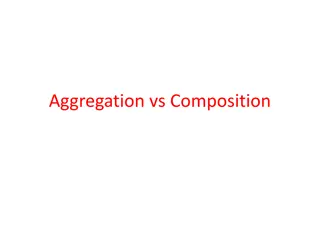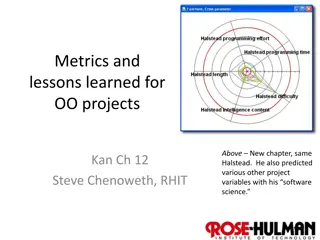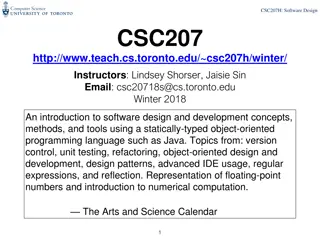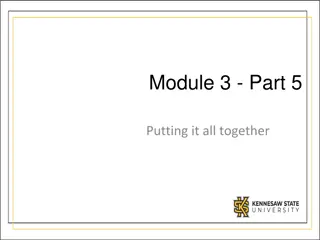Understanding Object-Oriented Design Principles
Explore the core concepts of object-oriented design, including objects, classes, and the object-oriented paradigm. Learn about the relationship between objects and classes, and how they form the building blocks of software development. Gain insights into class components, attributes, and methods, and grasp the significance of object behavior in computation.
Download Presentation

Please find below an Image/Link to download the presentation.
The content on the website is provided AS IS for your information and personal use only. It may not be sold, licensed, or shared on other websites without obtaining consent from the author. Download presentation by click this link. If you encounter any issues during the download, it is possible that the publisher has removed the file from their server.
E N D
Presentation Transcript
COMP 2000 Object-Oriented Design DAVID J STUCKI OTTERBEIN UNIVERSITY
Admiral Grace Hopper I am now going to make you a gift that will stay with you the rest of your life. For the rest of your life, every time you say, "We've always done it that way," my ghost will appear and haunt you for twenty-four hours.
ALERTS Questions? Lab 3 Objects: Due tomorrow, 1/18, by 11:15am Review: Start Concurrent chapter 9 Read: Start Concurrent chapter 10
The Object-Oriented Paradigm The old metaphor: Program = Data + Algorithms (Niklaus Wirth) Early languages focused on algorithms and data was an afterthought The new metaphor: Everything is an object & a program is a collection of interacting objects. Computation is object behavior. Method calls are inter-object communication. What is an object? Identity State Type Behavior
Objects Examples A student Attributes? First Name, Last Name, Student ID, Transcript, Financial Aid, Status, etc., ... Behaviors? Queries: getGPA, getName, getRank, etc., ... Commands: addCourse, dropCourse, graduate, etc., ... A playing card Attributes? Suit, Rank Behaviors? getSuit, getRank
Objects & Classes What is the relationship? Objects are instances of classes A class is a collection of similar objects (whether instantiated or not) A class is a template for constructing objects A class is an object factory A class is an abstraction of its instantiated objects (which details are missing?) Classes consist of Instance variables (state i.e., what it knows) Methods (behavior i.e., what it does) Constructors (guarantee that an object is created with a valid state)
Objects & Classes One way of thinking about it is that an object is a thing,whereas a class is an idea of a thing In Java, classes are represented as source code, whereas objects are represented at runtime In other words, you code a class but you construct an object
Class Components Attributes (Properties) Primitive vs. Reference Instance vs. Class Models an object's state Methods Instance vs. Class Query vs. Command Models an object's behavior Constructors What observations have you made? What questions do you have?
Example: A class modeling a counter comments /** * A simple integer counter. */ public class Counter { Instance variable /** * Increment the count by 1. */ publicvoid incrementCount(){ count = count + 1; } privateint count; /** * Create new Counter, with * the count initialized to 0 */ public Counter () { count = 0; } command /** * Reset the count to 0. */ publicvoid reset () { count = 0; } Constructor /** * Number of items counted */ publicint currentCount () { return count; } command } // end of class Counter query
Composition of Objects We know how to model objects' properties such as numbers (using int, float, double), or characters (using char). But what about properties like name, address, course schedule, or birthday? These attributes are objects, not primitive values In which case the instance variable should be a reference variable For example, to represent a birthday we would use a Date object and to represent a name we would use a String object.
Example: An object modeling a student String value 'T' Student 'o' 'm' name count birthday 3 Date gpa 3.572 month 10 day 3 year 2000
Java Bonus Topic: Enums An enum is a special kind of class that has pre-defined constant objects. These objects are intended to represent a fixed collection of named things: public enum Day { SUNDAY, MONDAY, TUESDAY, WEDNESDAY, THURSDAY, FRIDAY, SATURDAY } Individual days can be referenced like static variables: Day.MONDAY or Day.FRIDAY Since enum values are constants, it's convention to name them in ALL CAPS
Enums & switch Enums can be used in switch statements to make decisions switch(day) { case SUNDAY: System.out.println("Concert in the park"); break; case MONDAY: System.out.println("Is it Friday?"); break; case TUESDAY: System.out.println("Taco"); break; case WEDNESDAY: System.out.println("Hump Day!"); break; case THURSDAY: System.out.println("Throwback"); break; case FRIDAY: System.out.println("Dress down"); break; case SATURDAY: System.out.println("Date night"); break; } Note that only the value (SUNDAY) not the full name (Day.SUNDAY) is used This kind of behavior makes enums a useful way to record state information with a fixed number of values
Enum features Though they aren't often useful, enums have some information baked into them You can use the static values() method on the enum class to get an array containing all the enum values You can call the ordinal() method on an enum object to get its zero-based numbering in the list You can pass a String into the static valueOf() method to retrieve the enum object with a given name
Examples Sometimes it's useful to iterate over all the enum values Or get their number Or map a name to the enum value, but that will crash if you don't spell them right Day[] days = Day.values(); for(Day day : days) System.out.println(day + " has index " + day.ordinal()); Day manic = Day.valueOf("MONDAY"); Day francais = Day.valueOf("DIMANCHE"); // Crashes!
Enums as full classes People usually use enums simply as lists of constant values public enum Planet { MERCURY(2440, 3.3E23, 5.79E7), VENUS(6052, 4.9E24, 1.08E8), EARTH(6371, 6.0E24, 1.50E8), MARS(3390, 6.4E23, 2.28E8), JUPITER(69911, 1.9E27, 7.78E8), SATURN(58232, 5.7E26, 1.42E9), URANUS(25362, 8.7E25, 2.87E9), NEPTUNE(24622, 1.0E26, 4.50E9); However, enums are actually full classes whose objects can contain constant data and methods Note that the data inside can't be changed private int radius; // km private double mass; // kg private double distance; // km
Enums as full classes Here are the methods for the Planet enum from the previous slide private Planet(int radius, double mass, double distance) { this.radius = radius; this.mass = mass; this.distance = distance; } public int getRadius() { return radius; } public double getMass() { return mass; } public double getDistance() { return distance; } }
Next Time... Classes & Interfaces
